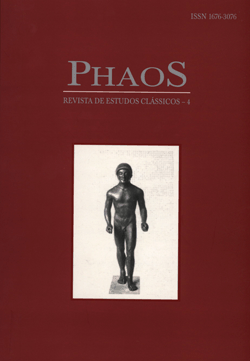Resumo
A detailed analysis of Ajax 1047-1162 indicates the way different political protocols familiar to 5th century Athenians could be articulated in the speeches of a tragedy. If we pay attention to the presence of epic strata, to the expression of multiple passions that determine actions and speeches, and also to some comic or quasi-comic moments, then it can be perceived that neither Menelaus nor Teucer defend or represent coherently a political regime. The text shows to the spectator, first of ali, the limits of speech and power.
Referências
BLUNDELL, M. (1989) Helping friends and arming enemies: a study in Sophocles and Greek ethics. Cambridge.
BUDELMANN, F. (2000) The language ofSophocles: communality, communication and involvement. Cambridge.
DENNISTON, J. D. (1950) The Greek particies. 2. ed. Oxford.
EASTERLING, P. E. (1993) "Tragedy and ritual". In: SCODEL, R. (org.) Theater and society in the classical world. Ann Arbor.
GARVIE, A. F. (1998) Sophocles: Ajax (introdução, tradução, comentário). Warminster.
GRIFFIN, J. (1999) "Sophocles and the democratic city". In: GRIFFIN, J. (ed.) Sophocles revisited: essays presented to Sir Hugh Lloyd-Jones. Oxford.
HEATH, M. (1987) The poetics ofGreek tragedy. Londres.
HOLT, P. (1981) "The debate scenes in the Ajax". 102: 275-88.
KAMERBEEK, J. C. (1963). Theplays ofSophoc1es. Parte 1: "The Ajax". 2. ed. Leiden.
LLOYD-JONES, WILSON, N. G. (1990) Sophocles: Tragoediae. Oxford.
LORAUX, N. (1994) Invenção de Atenas. São Paulo.
LSJ = LIDDEL, H. G. & SCOTT, R. (1996) A Greek-English lexicon. Revisão e aumento de H. S. JONES. Com suplemento revisto. Oxford.
MANNSPERGER, B. (1971) "Die Rhesis". In:JENS, W Die Bauformen der Griechischen Tragödie. München.
MEIER, C. (1991) De la tragédie grecque comme art politique. Paris. (1. ed. alemã: 1990)
MOST, G. W. (1985) "Pindar, Nemean 7.64-7". GRBS 26: 306-31.
MURARI PIRES, F. (1999) "Menelau, o herói segundo". In: Mi história. São Paulo.
MURRAY, O. (1982) Das frühe Griechenland. München. (1. ed. inglesa: 1980)
PARKER, R. (1996) Miasma: pollution andpurification in early Greek religion. Oxford.
POE, J. P. (1987) Genre and meaning in Sophocles' Ajax. Frankfurt am Main.
REDFIELD, J. M. (1994) Nature and culture in the Iliad: the tragedy ofHector. 2. ed. Durham. London.
REINHARDT, K. (1971) Sophocle. Paris. (1. ed. alemã: 1933)
ROSE, P. W. (1995) "Historicizing Sophocles' Ajax". In: GOFF, B. E. (org.) History, tragedy, theory: dialogues on Athenian drama. Austin.
ROUSSEAU, P. (1990) "Le deuxième Atride: le type épique de Ménélas dans I'lliade".
In: MACTOUX, M.-M & GENY, E. (org.) Mélanges Lévêque 5. Paris.
RUSTEN, J. S. (1989) Thucydides: the Peloponnesian war. Book Il. Cambridge.
SCHADEWALDT, W. (1991) Die griechische Tragödie. Frankfurt am Main.
SEGAL, C. (1995) "Drama and perspective in Ajax". In: Sophocles' tragic world: divinity, nature, society. Cambridge (Mass.), London. (l. ed. do art.: 1989-90)
SEIDENSTICKER, B. (1971) "Die Stichomythie". In: JENS, W (org.) Die Bauformen der griechischen Tragödie. München.
SMYTH, H. W. (1956) Greek grammar. Cambridge (Mass.).
STANFORD, W. B. (1981). Sophocles Ajax (introduçäo, texto, comentário). Bristol.
VIDAL-NAQUET, P. (1993) "Ajax ou a morte do herói". Filosofia Política 7: 9-30. (1. ed. francesa: 1988)
WERNER, C. (1999) Troianas, de Eurípides: estudo e tradução. Sao Paulo. (Dissertaçäo de Mestrado)
WINNINGTON-INGRAM, R. P. (1980) Sophocles: an interpretation. Cambridge.

